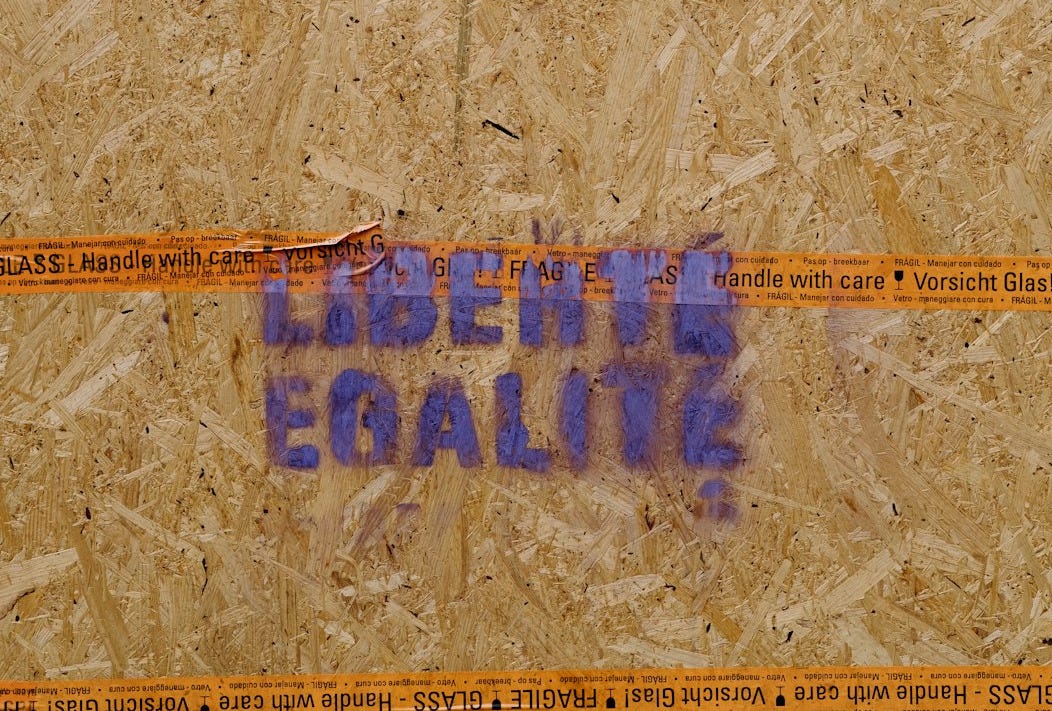The problem with Equality
It would be complete economic equality for at least the next few minutes. Almost instantly we would see inequality arise yet again.

Written by: James Peron
The problem with equality is it can mean anything and sometimes does.
To say something is equal you still have to clarify to what it is equal.
Most of us like to say we believe in equality in regards to humans. But even that needs clarification. I don’t think it means all people are equally talented. I sure know I’m not equally as athletic as most, especially at my age. I promise the last place you’d want to see me in action is a rugby field or a cricket pitch.
What we liberals mean by “equality” is quite concise; all people have equal rights before the law and thus enjoy equal liberty.
Unfortunately, some people assume it ought to mean other things—such as equality of wealth. But imagine a community where on Monday every citizen’s bank account was magically made equal to R50,000. Those with less savings on Sunday see it go up and those with accounts that were higher saw their savings diminished.
It would be complete economic equality for at least the next few minutes. Almost instantly we would see inequality arise yet again.
Some would take their windfall and invest it wisely earning more income as time goes by while others wouldn’t be able to spend it faster. Some would head off to the casino and gamble away their fortune while others might decide to buy a round at the local shebeen or buy luxuries they previously couldn’t afford.
The philosopher David Hume noted this was the case back in 1748 when he warned, “Render possessions ever so equal, men’s different degrees of art, care, and industry, will immediately break that equality.” This observation is not new..
If you think about it this means two different concepts of equality are automatically at war with one another. In the wealth windfall example the individuals were free to choose what they would do with their newfound resources. What ultimately led to their inequality of results was the free choices they made. Each was free to invest it or buy a round at the shebeen but they used this equal freedom differently.
Nobel prize winning economist F.A. Hayek warned, “Equality before the law and material equality are therefore not only different but are in conflict with each other; and we can achieve either one or the other, but not both at the same time.”
Historian Will Durant was even more forceful in his observation: “Freedom and equality are sworn and everlasting enemies, and when one prevails the other dies. Leave men free, and their natural inequalities will multiply almost geometrically, as in England and America in the nineteenth century under laissez-faire. To check the growth of inequality, liberty must be sacrificed, as in Russia after 1917.”
Certainly many attempted to achieve equal results by stamping out equal liberty. Mao tried it in China, Pol Pot tried in Cambodia and even Hitler targeted Jews by saying their general prosperity was a form of theft—a position Marx took as well in his anti-Semitic diatribe On the Jewish Question. Hitler confiscated Jewish wealth and used it to finance his redistributionist policies for rank and file Germans.
But Hitler discovered there was only so much wealth he could confiscate and redistribute. He resorted to confiscating wealth from other nations he attacked, but even that ended badly. In every such instance, where equality of results was put ahead of equality of liberty, the result has been to destroy wealth. They succeeded in tearing the top down but not raise the bottom up.
One problem is people only want equal wealth with those economically better off. The 19th century French writer Henry Becque observed, “The defect of equality is that we desire it only with our superiors.”
In addition they all were forced to resort to the most authoritarian and violent means of stamping individual freedom they could find. In order to achieve equality of results the would-be planner has to strip away equality of liberty, but there is a second kind of equality. He strips you of control over your own life while he has control over it instead.
He must plan your choices, not you. He would have to determine how you use your resources—if you are allowed any. This equality of results can only exist when mandated and for mandates to work they must be enforced which requires violence or the threat of violence. This is not done through unanimous consent as such consent is impossible.
Over the years various nations have sought this equality of results but the results were always in the direction of greater equal poverty not wealth. Winston Churchill told the British House of Commons: “The inherent vice of capitalism is the unequal sharing of blessings. The inherent virtue of Socialism is the equal sharing of miseries.”
James Peron has written for multiple publications and author of several books, including Exploding Population Myths and The Liberal Tide. James is an Associate of the Free Market Foundation.




